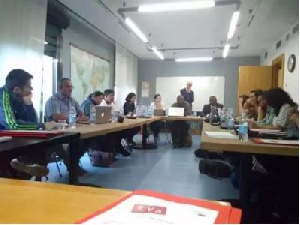 The Staff of (GDCA) were among the first to undergo training for certification in Ghana
The Staff of (GDCA) were among the first to undergo training for certification in Ghana
The European Union (EU) has begun a series of training as part of the certification process to enable communities to receive and manage EU volunteers in Ghana under the EU Volunteers in humanitarian Aid (EVA) project.
The Staff of the Ghana Developing Communities Association (GDCA) were among the first to undergo training for certification in Ghana.
The first training took place early in June, this year, in Cantú, Italy where the partners reviewed their organizations’ activities, got insights into the overall concept of EU Humanitarian Aid and Volunteers and requirements for certification.
An Italian non-governmental organisation ASPEm, which has been involved in international cooperation, humanitarian aid and development since 1979, is implementing EVA initiative in collaboration with its partners APY in Spain and ADICE in France.
The GDCA, a non-governmental organisation (NGO) based in Tamale, and the Association Asticude based in Morocco, were the only two organisations selected in Africa by ASPEm under the EVA project.
The EVA project is an initiative of the Directorate-General for European Civil Protection and Humanitarian Aid Operations (ECHO) that supports humanitarian aid projects and strengthens the local capacity and resilience of disaster-affected communities, through the deployment of volunteers.
It focuses on improving capacities and providing technical assistance to the third-country organizations selected to go through the certification process. The other component is the deployment by consortia of EU and third-country organizations such as GDCA.
The certification process also requires that GDCA as an organisation should go through an assessment process and assisted to improve on its procedures to meet the EU volunteer management standards before the authorisation to send or receive volunteers under the EU Aid Volunteers initiative.
Alhaji Osman Abdel-Rahman, Executive Director of GDCA, who briefed the GNA in Tamale, said “After successfully going through certification, which is expected to be completed by December 2019, GDCA will be able to receive and deploy EU Aid volunteers in humanitarian interventions and contribute to the reduction of suffering of victims of disasters and conflicts, especially women and children, who are mostly the victims.”
Alhaji Abdel-Rahman said, “For GDCA itself, the project will lead to the expansion of its scope of partnerships around the world.”
He spoke about GDCA’s activities over the years saying, “GDCA has a long history of humanitarian aid, dating as far back as the late 80s and early 90s, when the organisation was involved with the NGO Consortium, helping communities and victims of disasters such as floods and drought, as well as conflicts in Northern Ghana.”
He added, “In 2011, GDCA worked with the Institute of Justice and Reconciliation of South Africa to develop and support the Dagbon conflict through the Dagbon Peace Initiative project with various partners including the Catholic Diocese of Yendi and West Africa Network for Peace Building – Ghana.”
He expressed GDCA’s gratitude to ASPEm for the opportunity to collaborate on the EVA project.